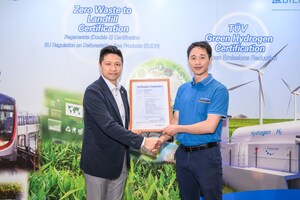TÜV Rheinland and BRE jointly issue the first smart building certification in China to Nanjing MixC World
NANJING, China, July 18, 2023 /PRNewswire/ -- TÜV Rheinland, an international independent third-party testing, inspection, and certification organization based in Germany, has partnered with the British Building Research Establishment (BRE) to award the first smart building certification in China to the Nanjing MixC World developed by China Resources Land Nanjing Limited. The comprehensive rating of the project attained "Excellent," and the rating of the participating modules attained "Outstanding."
The MixC World is located on Zhongshan South Road, Qinhuai District, Nanjing City, with a construction area of 136,000 square meters. It is composed of "mall + block + ancient buildings," with the "Yunzhang Guild Building" historical and cultural building restored from the original site as the core, forming a cultural and commercial atmosphere integrating ancient streets and alleys.
This project is a smart shopping mall based on Internet of Things (IoT) technology and intelligent systems. By creating various smart scenarios, it provides a convenient, efficient, and comfortable shopping experience. The project utilizes IoT, 5G, WiFi, big data, and other technologies to digitize and upgrade the mall into an intelligent facility. The intelligent system used includes information networks, information guidance and releases, customer flow analysis and statistics, intrusion alarms, video surveillance, intelligent fire protection, parking management, automatic control of building equipment, lighting control, and energy efficiency management.
The "Swarm Intelligent System," as the core system, can optimize the energy-saving control of building systems and improve operational efficiency. The system adopts a B/S architecture and has automatic monitoring functions for the central cooling system, boiler room control system, building equipment automatic control system (BA), intelligent lighting system, and electric power monitoring system. The swarm intelligent monitoring software has remote control, fault alarm, historical data storage, and trend curve display functions.
The project has a 2-star green building design, and is a pilot project for efficient data centers, showing excellent performance in green and low-carbon aspects, with an annual refrigeration energy efficiency ratio of 6.12, meeting the first-level energy efficiency standard. Strategies and measures such as cold room control, intelligent load regulation of chiller units, water pump and cooling tower control, end control, and linkage have been adopted for the project to improve the overall energy efficiency ratio of the refrigeration room and reduce project operating costs.
At the same time, high-efficiency light sources, high-efficiency lamps, and energy-saving control measures are used for lighting in various areas, including the use of energy-saving lamps and electronic ballasts for green lighting. Control measures such as zoning, timing, and induction have been implemented for the lighting system in public areas such as corridors, stairwells, lobbies, entrances, and underground parking lots. In addition, a smart nursery room has been set up in the mall, including real-time sensing of occupancy of the breastfeeding room through the installation of IoT sensors and the use of various access control methods to prevent unauthorized use, providing users with a convenient, safe, and private experience.
TÜV Rheinland reviewed the information infrastructure and smart low-carbon aspects of the Nanjing MixC World project based on the full set of drawings for the building's mechanical and electrical intelligentization, intelligent design data, green building design data, BIM drawings, system and equipment debugging data, and on-site inspections. The result shows that it meets the requirements of the "Smart Building Evaluation System."
TÜV Rheinland and BRE jointly released the "Smart Building Evaluation System" in November 2022, which has been filed with the China National Accreditation and Certification Administration (CNCA). The evaluation system assesses four modules: data and information security, building space and structure, green and low-carbon, and health and comfort. Based on ensuring the safety and effectiveness of a building's information infrastructure, it focuses on the green performance, spatial structure performance, and indoor health and comfort of the building from an intelligent perspective, guiding achievement of the composite goals of safety, comfort, greenness, and intelligence for the building. To apply for project certification, please click here.
SOURCE TUV Rheinland Greater China






Share this article